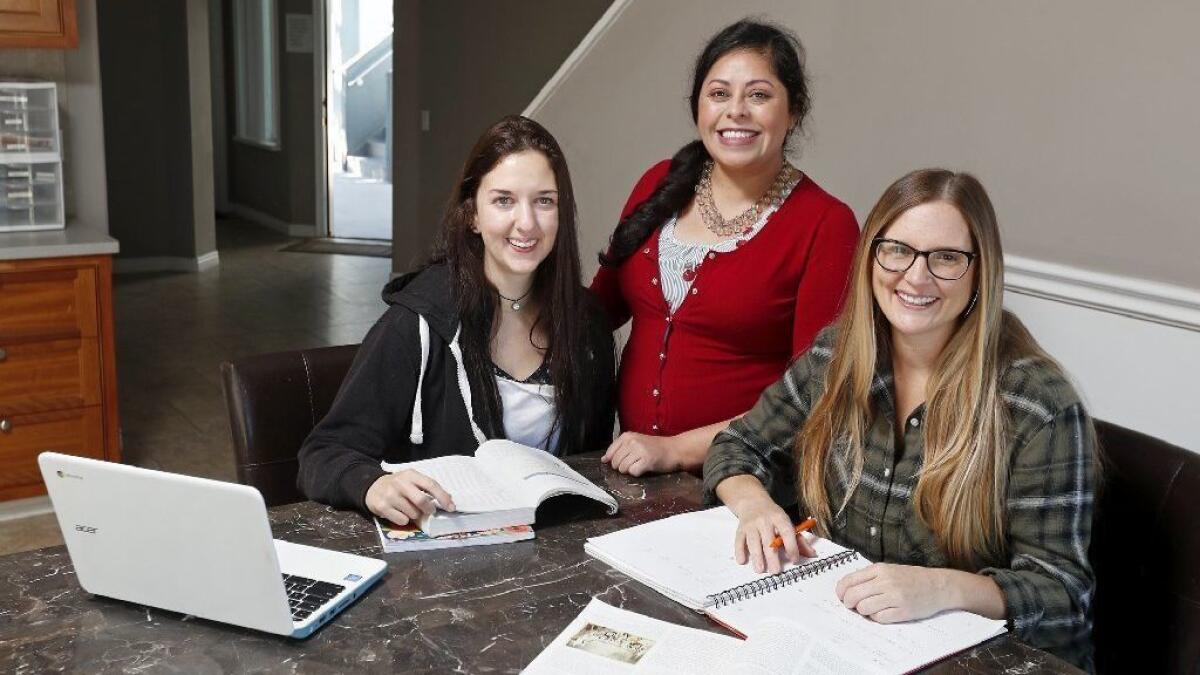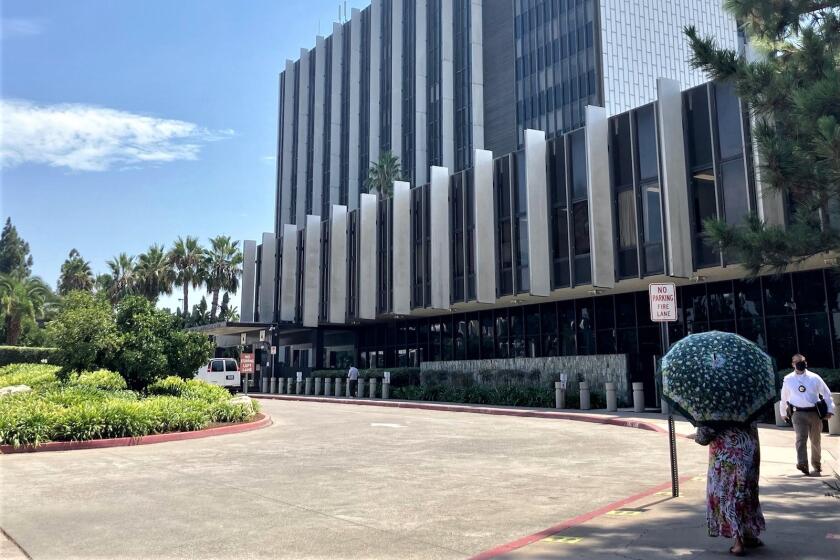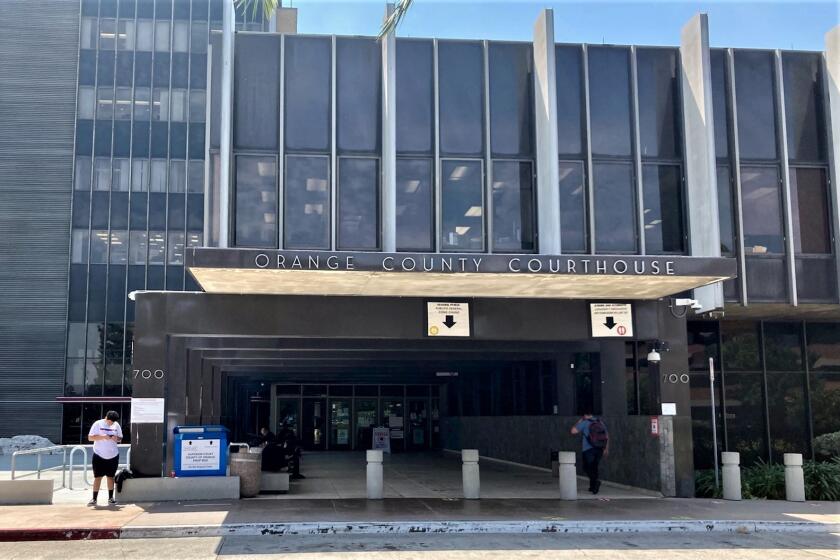Los Alamitos nonprofit uses education, therapy to help at-risk women

- Share via
She said she was alone.
Alone when a rare disorder killed the nerves in her spine, leaving her bound to a wheelchair at age 11.
Alone when she was beaten as a child, despite the medical condition.
Alone when a man raped her in a college dorm room.
Alone when she tried to kill herself afterward.
Sarah, who described these traumas in an interview with TimesOC, found no havens. Pain shadowed her.
Refuge came in the form of Pathways to Independence, a Los Alamitos-based nonprofit that helps at-risk women. With only one full- and two part-time staff members, the group relies on hundreds of volunteers.
“I grew up a shell of a person waiting to die,” Sarah said. “Pathways put life back into me.”
Because she is a rape victim, TimesOC agreed to Sarah’s request to only publish her first name.
Founded in 1991 by Dave and Joyce Bishop, Pathways guides women ages 18 to 35 out of poverty, adversity and abusive environments by providing healthcare, therapy and housing. Pathways owns three apartment buildings in Huntington Beach.
The sole requirement of the program is that the clients finish school. This includes trade schools, but about 80% walk away with a bachelor’s degree.
“The main purpose is for these women to get an education,” said Goretty Ramos, executive director. “This way they are able to focus on school and not worry about having to pay rent or other issues.”
In removing barriers between the client and their education, the group provides each woman with a car and a mentor who, according to Sarah, acts like a mother.
Women generally stay in the program for three to five years. Pathways is currently serving 48 women.
Sarah, 25, graduated from the program this year. For her, Pathways played a crucial role in redefining what life can look like.
For many years Sarah only knew despair. When she was 11, Sarah collapsed after getting out of a pool. Despite not feeling well, her parents went out to dinner without her, she said.
Then the pain started.
It worked its way down her back. It felt like someone was chiseling away at the nerves in her spine. She was experiencing the onset of a rare form of a disorder called transverse myelitis.
By the time her parents came home, the nerves were dead, and her legs no longer worked. Sarah has used a wheelchair ever since.
Life wouldn’t get any easier. When she came to Pathways a few years ago, it took about a year before she could believe that anyone would help her without an ulterior motive.
“I wanted them to just give up on me so I could confirm that I had no value,” Sarah said.
She forged bonds with her therapists and mentor. She opened up about the rape for the first time — she had not reported it.
“They never gave up on me, no matter how much I pushed everybody away,” Sarah said.
Sarah is now a teacher and hoping to get a master’s degree in history. She was recently honored by Rep. Alan Lowenthal (D-Long Beach) at a Pathways fundraiser.
Sarah is attempting to reconcile with her parents, though it’s a process. She never told them about the rape or Pathways.
“I’ve learned to love them at a distance,” Sarah said. “That’s my past. Now I am moving forward.”
Tiffony Jacobs said she battled poverty and abuse before Pathways stepped in.
“Pathways gave me the outlook that life could be what you make it,” said Jacobs, who graduated from the program in 2006.
Jacobs, now 38, grew up in a gang-ridden area of Long Beach.
For several years she was on the street or moving between motels with her mother, father and three siblings.
“We were always on the brink of homelessness, and then one day we were just homeless,” Jacobs said. “We were living in hotels and motels and trying to find a cot in church. Then we actually had to lay our head on the concrete ground. It’s been a very pivotal moment in my life to make sure I never go back to that.”
Jacobs’ mother would take to the streets panhandling so she could feed her kids.
Tiffony Jacobs remembers making the “Will work for food” signs for her mother. She was 10.
They eventually secured a one-bedroom home for all six of them.
Things improved for Jacobs at Woodrow Wilson High School, where she joined the Freedom Writers — a group of at-risk students who overcame hardship through writing. Their stories were adapted into a book by their teacher and then a 2007 movie starring Hillary Swank. One of the film’s characters was based on Jacobs.
Later she joined Pathways.
“I remember my first therapist at Pathways looked at me in shock because I just burst out crying after saying two words,” Jacobs said. “I had never had an intimate moment where I just let everything out.”
With the removal of the barriers she experienced throughout her life, Jacobs learned she had agency and could captain her future. She graduated from Cal State Long Beach and currently works for World Financial Group.
“The program allowed me to face what happened to me,” Jacobs said. “To see that I have the ability to not repeat the cycle. That if I took the steps to get an education, I can go further than my mom did.”
For more information about Pathways to Independence, visit pathwaystoindependence.org. To volunteer, visit pathwaystoindependence.org/volunteer-form/
Twitter:@benbrazilpilot
All the latest on Orange County from Orange County.
Get our free TimesOC newsletter.
You may occasionally receive promotional content from the Daily Pilot.




